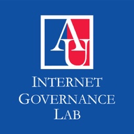Texas A&M professor Sandra Braman presents at symposium on Internet governance research methods.
By Kenneth Merrill
The Internet Governance Lab hosted a group of scholars on Monday to lay the groundwork for a forthcoming first-of-its-kind book focused on Internet Governance research methods.
Following introductory remarks by AU Dean Jim Goldgeier, contributors engaged in a lively discussion covering a wide range of methods and approaches to studying Internet governance. Participants included Laura DeNardis, Nanette Levinson, and Derrick Cogburn of the Internet Governance Lab, Sandra Braman of Texas A&M, Asvatha Babu of American University’s School of International Service, Farzaneh Badiei of Georgia Tech, the University of Zurich’s Rolf Weber, Eric Jardine of Virginia Tech, Rikke Frank Jorgensen of the Danish Institute for Human Rights, Maya Aguilar of American University, Francesca Musiani and Meryem Marzouki both of the French National Centre for Scientific Research, Ron Deibert of the University of Toronto’s Citizen Lab, American University School of Communication professor Aram Sinnreich and AU School of Communication PhD candidate Kenneth Merrill.
While the field of Internet governance continues to grow, both in its size and importance for scholars, policymakers, and IT practitioners, there exists little in the way of literature addressing the methods used to study this increasingly important subject area. Relevant methodological traditions include quantitative, qualitative, and descriptive analyses drawing on case studies, interviews, and participant observation at Internet governance fora like the International Corporation for Assigned Names and Numbers (ICANN) and the Internet Governance Forum (IGF). Meanwhile, the proliferation of large data sets, artificial intelligence, and machine learning pose novel opportunities and constraints, including important ethical implications. Highlighting this point, Ron Deibert explained the importance of reverse-engineering and hacking ICTs as a means of identifying potential threats to privacy and free expression online, a practice that can place scholars and research subjects at risk.
Additionally, the symposium addressed the extent to which many methods are inextricably intertwined with theory. Here the field of Science and Technologies Studies (STS) is instructive, as methods like Actor Network Theory (ANT) operate from a distinct epistemological standpoint that needs to be accounted for when discussing the method. To this end, part of the project will seek to trace the history of the field and identify the epistemological nodes around which these disparate methodological approaches coalesce.

